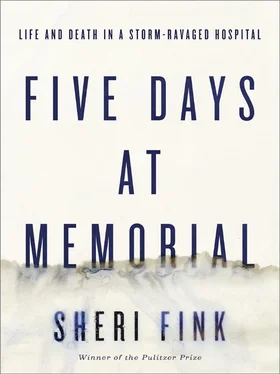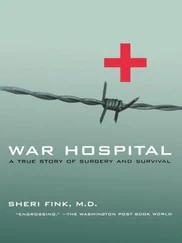The dialysis procedure required water, but the city water was reportedly so heavily contaminated with chemicals and bacteria that it would be dangerous to bathe in it. The doctor faced a decision. The patients would die without dialysis, and it was unclear how quickly they could be transferred out of Memorial. Workers would filter the water and hope for the best. Staff members formed an assembly line to boil water in the microwave and stockpile it for other uses.
Within view of the hospital windows people were ransacking a Walgreens. One Memorial administrator wrote an e-mail to her family at ten twenty in the morning describing what she had heard from the security supervisor.
They are locking down the whole hospital to keep the looters out. We are under marshall law so our security officers can shoot to kill if they want.
A NATIONAL GUARD soldier jogged up to a group of people mingling outside the hospital.
“Who’s in charge?” he asked.
“I am,” a short, muscular man in his early forties answered. Eric Yancovich was Memorial’s plant operations director and a member of the hospital’s emergency leadership team. He was outside snapping photographs to document the damage Katrina had caused the hospital. Blown-out windows and light fixtures. A collapsed penthouse. Bent antennas and exposed roof joints.
The National Guardsman told him the levees protecting New Orleans had been breached. “You need to prepare for fifteen feet of water,” he said. “Yeah right,” Yancovich muttered. Then he saw the soldier wasn’t kidding. “Will you come into the command center?” Yancovich asked. “Because I’m not bringing this news in by myself.”
Yancovich knew they were in trouble. The design of Memorial’s backup power system had a flaw all too common in flood zones, the one that the state and federal emergency officials had discussed in their conference call immediately before the storm. When Tropical Storm Allison inundated Houston in 2001, hospitals in the nation’s largest medical complex, Texas Medical Center, lost power because either emergency generators or their various electrical components were located below flood level. News of the incident had alarmed New Orleans’s health director, Dr. Kevin Stephens. The following year, he had surveyed representatives of every hospital in the city, asking whether they could withstand a flood with fifteen feet of water, how much it would cost to elevate generators if needed, and whether there was interest in having the city look into the possibility of federal funding to make improvements. One letter went to Memorial’s emergency committee head, Susan Mulderick.
The response from the hospitals was unenthusiastic. It would cost much more than they had to spend, millions of dollars in at least one case. The initiative never went anywhere, and that was why, the day before Katrina made landfall, the federal emergency management officer had been told that all but two of the hospitals in New Orleans had either generators, electrical switches, or both at ground level.
That was the case at Memorial. After Hurricane Ivan’s near miss in September 2004, the hospital’s leaders had reviewed hurricane plans. Eric Yancovich himself attended a meeting with the US Army Corps of Engineers and studied government storm-surge models—known as “SLOSH” for sea, lake, and overland surges from hurricanes—which estimated the height of a wall of water driven onto land by a hurricane’s winds. He learned that if a Category Four or Five storm hit the city and caused the lake or the river to flood it, twelve to fifteen feet of water could rise up around Memorial, which sat three feet below sea level.
By hand, on a piece of lined paper after the Army Corps of Engineers meeting, Yancovich had sketched out the elevation of various hospital entrances and critical outdoor equipment in relation to the center of Magnolia Street, a narrow road perpendicular to Napoleon Avenue that ran along the back side of the hospital. His calculations showed it would take less than four feet of street flooding for water to flow over the loading dock and into the hospital. He knew that while the hospital’s backup generators on the second floor were at a safe elevation, some critical parts of the emergency power distribution system were located below ground level or only inches to a few feet above it.
The story this told was clear and grim. “Based on these readings it won’t take much water in height to disable the majority of the Medical Center,” Yancovich had written in a note to his supervisor several months before Katrina. He predicted that power would be lost in the main hospital and all patients would have to be moved to the newer Clara Wing, where he believed the electrical circuitry was better protected.
Yancovich’s department had taken a few steps to harden the hospital’s defenses, including adding floodgates and raising the vent for the underground diesel fuel tanks. But more extensive work needed to be done. Yancovich had recommended elevating basement and ground-level emergency power transfer switches and the pumps that supplied most of the hospital with medical air and vacuum suction, needed by patients with respiratory problems. A partial bid for the electrical work came to more than a quarter of a million dollars. “Due to the lack of capital, I don’t anticipate anything being approved right now,” Yancovich had concluded in his recent memo. “I’ll keep it on file for future consideration.”
The backup generator system was only as robust as its weakest part. Now, with floodwaters heading for Memorial, it was the hospital’s Achilles’ heel. They all needed to get out of the hospital. Yancovich knew it. Susan Mulderick knew it. She advised Memorial CEO René Goux, who spoke with his bosses at Tenet, in Dallas. He told them that evacuation looked likely.
“WHERE’S VINCE?”
The nurse asking about Dr. Anna Pou’s husband looked concerned. Vince Panepinto had surprised Pou the previous evening by showing up at the hospital. A security guard had paged her through the overhead speakers. Panepinto had spent the night with Pou and the surgical nurses in the endoscopy suite, his tall frame squeezed onto a little stretcher. He charmed the nurses with his dark good looks, and they agreed Pou had done well after the breakup with her former boyfriend.
Panepinto left the hospital that morning to take care of their recently purchased home about a mile from Memorial. He had wanted Pou to join him, but she still had patients at the hospital, and the staff was not supposed to leave. “I’ll be home before you know it,” she’d told him.
“Oh my God, you need to get him,” the nurse said. “Look outside.” Pou joined her at the windows overlooking Clara Street. Water was gushing out of the sewer vents. They stared in disbelief. Then they jogged up three flights of stairs to the eighth floor to get a better look at the neighborhood. Water was flowing up Claiborne Avenue, a main city artery just north of the hospital.
Faces appeared at windows all over Memorial. Some doctors would later say the sight of the water advancing toward the hospital, pushing the hurricane debris ahead of it, was like something out of a movie: a glob of murderous slime from a ’60s sci-fi thriller, or the mist-cloaked Angel of Death wafting down Egyptian streets to envelop the homes of firstborn sons in Cecil B. DeMille’s The Ten Commandments . To a LifeCare patient’s daughter, Angela McManus, who was standing on Memorial’s smoking balcony, the blackness overtaking the ground looked like the shadow of a cloud.
Читать дальше













